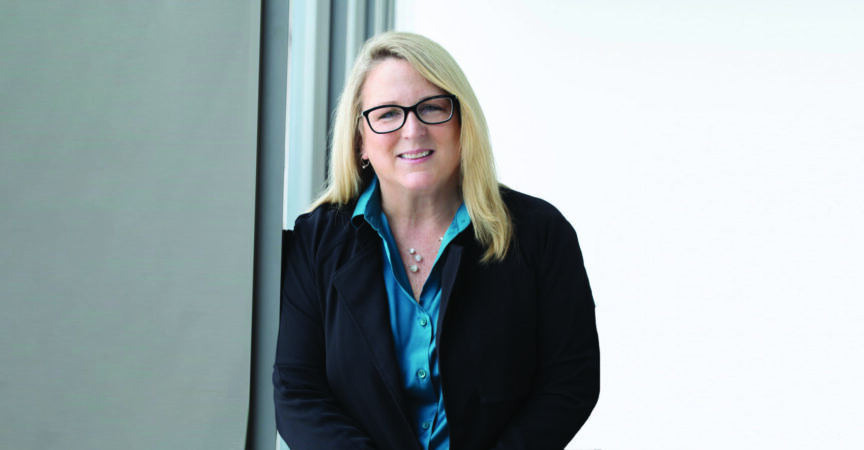In Conversation with Tracy Macgregor, Restaurants Canada’s Vice President for Ontario

In January, Tracy Macgregor was appointed Restaurants Canada’s Vice President, Ontario. Her experience straddles several key sectors including hospitality, tourism and Ontario’s chamber network, giving her the interdisciplinary insight and collaborative mettle to effectively represent the needs of Ontario Members before policy makers, media and consumers.
Digging past her impressive resume, Tracy is a passionate food enthusiast and devoted traveller, who gives all-inclusives a pass, preferring to experience the “real deal”. Maybe too real as she once was chased by a polar bear as she rode on the back of an ATV in Fort Severn, an experience she recounts with laughter, explaining, “I was terrified! Our guide knew that polar bears can’t pivot, but an ATV can – but of course I didn’t know that.”
Tracy is a strategic thinker, with a mind that doesn’t stop. In nicer weather, she will take advantage of using the time to walk the 6 km to work as thinking time. This thoughtfulness has only compounded her belief in sector recovery and the idea that unity, collaboration and innovation are key to addressing
the challenges.
MENU: Can you share a little bit about your background and how you came to take on such a significant role at Restaurants Canada?
My background is in tourism actually—my education background is in conventions and tourism. At the beginning of my career, I worked with a tour operator that grew exponentially over the 13 years I was there. They went from a handful of people when I started, to about 200 internationally when I left. And, at the same time, I worked in restaurants. That was my hustle all through college. And most of the years that I worked in tourism, I also worked a part-time job at a wine bar downtown—The Hop and Grape. It’s not there anymore, but it was an institution at the time. I’ve just always been part of or connected to the hospitality industry, and I love it.
Eventually, I left tourism because I had a young child and I was travelling a lot, which is not exactly conducive to having a small child at home. I then joined a consulting firm with a focus on value delivery and competitive differentiation, working with statistics and predictive intelligence to uncover the underlying value drivers that customers cared about. We worked with major corporations in retail, telecommunications, finance, and associations to help them differentiate their offerings.
After another 13 years there, my daughter was entering high school. I was getting home late and she was finished school at 2:30 in the afternoon, so I decided to work locally and took on a business development role for the Newmarket Chamber of Commerce, eventually taking on the President and CEO role there and ultimately joining the Ontario Chamber of Commerce as VP Member Services & Business Development. I spent ten years in the Chamber Network raising my voice for businesses—working with all levels of government to make sure it was easy to do business, that there was a competitive environment and that business owners had the tools and supports they needed to thrive. It was a very collaborative work environment that was intertwined with the understanding that businesses are really the heart of communities. They support the sports teams and the arts; they give to charities—it’s a big circle. The better small businesses do, the better the community does. I really have a passion for that.
When the opportunity came up with Restaurants Canada, it really just felt like the culmination of all of those roles. The focus here is on value delivery, on member services, on government relations, and on hospitality, which is something that I truly care about. It just felt right for me. It’s almost like I feel like I was in training all those years for this; it feels like home.
MENU: You picked a challenging time to take on this role, and your background does feel a little bit like the perfect training course. The restaurant industry is in the midst of transformation—some tough challenges remain, yet there are a lot of new opportunities—is that attractive to you?
I have a very entrepreneurial thinking style, or “intrapreneurial” as I’ve never actually gone out on my own as an entrepreneur. I tend to think innovatively about turning challenges into opportunities—that really interests me. It is a challenging time for restaurants. It’s a challenging time for our association. Strategy and innovation are really needed right now, so I love that I’m coming in with this experience and skillset and can raise my voice not only for our members, but for the reshaping of the association.
MENU: Having worked in the hospitality industry and refined your experience in business development, strategy and value delivery gives you a unique perspective. Where do you see the big opportunities to support members, and what are your priorities?
Everyone’s priority has to start with supporting our industry and helping it thrive. There are a lot of challenges right now around compounding costs, CEBA loans that are coming due, mounting debt, labour shortages—these are tough issues. So, the front-end focus is on getting a little bit of relief. At the same time, we’re looking for ways to innovate and are helping operators be innovative as well. There is an incredible strain on the sector. I want to hear, feel and understand that from the operators perspective to make that part of the voice I’m bringing to government.
MENU: The announcement of your ascension to the role of VP, Ontario mentioned that unifying the industry was a key priority for you. What makes unity so important right now?
When COVID-19 hit, I saw it firsthand in my role at the Chamber. I mean, those were people and business owners I knew personally that were impacted. They were calling me up, and the strain on them was incredible. It really breathed life into my advocacy work, because knowing people who are affected and under strain makes a big difference in being able to speak on their behalf. I think that is a unique position to be in.
I have always been very collaborative and made working with other organizations a priority. Restaurants Canada will take the lead where we can; however, working with other associations and stakeholders to move efforts forward is going to be very important right now. To get things done, we’ll need many voices and collaboration. And collaboration is hard – if it wasn’t more people would do it. You need to keep that in mind when you’re building relationships and reaching out to other organizations, government, stakeholders, partners and suppliers. All that matters if we’re going to come out of this and have a thriving industry.
The industry is comprised of many different segments. We have quick serve, catering, partners, chains and independents… They all have pain points, but they experience them differently. That’s important for me to understand and articulate in my role. In this case every voice does matter.
MENU: What most near-term items or areas of focus are within your portfolio?
One of the biggest pieces right now is building relationships with government. I’ve been spending a lot of time meeting with different ministries to share data on the state of our sector. That data can be cut in a number of ways, which the government can find very useful in making policy decisions. Spending the time to make sure we have strong relationships with key ministries and making sure they understand what our industry is going through and experiencing is crucial.
We want to be part of the solution. We’re not saying, “Here are all these challenges. Fix them for us.” It’s about being a partner at the table and helping find those solutions, helping inform the conversations. We want to be very much top of mind when those consultations are happening and proactively getting ahead of them to make sure our perspective, voice and policy suggestions are considered to make things easier for our industry.
The second element is media relations, which fits right in with government relations. We want to make sure we’re keeping the media informed, because consumers care. Restaurants are where we gather—they’re part of our lives. They’re where we celebrate, find comfort gather with friends and, in some cases, are known by name in our community.
These pieces are very much my focus in putting together a strategy for Ontario and making sure that we are hearing the voices of all our groups.
MENU: Everyone is aware, I think, of the dog’s breakfast of issues confronting the national foodservice industry, from hyperinflation to labour to supply chain challenges. What is of most concern in Ontario?
Ontario is behind the Canadian average in terms of recovery—we aren’t seeing recovery in the same way here. We have more restaurants struggling to meet profitability, for example, and a lot of that is a result of the ongoing work-from-home environment. Downtowns in Ottawa and Toronto are very much feeling the impact of the workforce not returning to downtown cores – it’s hurting recovery.
For example, the municipality of Toronto is very important to Ontario. It’s by no means the only focus, but it is a focus because of the unique challenges and size of the market here. My first couple of weeks here I spent a lot of time on CaféTO, which was going to reinstate patio fees. We had a win very early because we made the time to go to city council. We don’t always raise our voice at the municipal level, but this time, we did. We presented a deputation at Executive Committee, explaining the situation and why restaurants couldn’t afford the fees. In the end, council cut those fees by a third to spread it over three years. So that was an early win, and the learning is that people and governments don’t necessarily grasp the full context or implications of a policy change. It might seem like a small fee for one level of government, but it’s being compounded at every other level of government. So, we need to make the time to explain.
MENU: What kind of stories are you looking for, and why do they help with advocacy?
Hearing from our members and their experience is what I want. I want to have a team of people who are willing to talk about their issues so we can share and humanize their stories.
A story goes a lot further with an MPP, MP or Councilor because it’s about a real person or family in their area, and that makes a difference. It is difficult to share the challenges they may be having especially when it comes to debt load or profitability. Perhaps even more so now because they’re feeling it so personally and acutely. In general, people don’t want others to know they’re struggling, and so that’s part of the difficulty. I hope members will feel that they can reach out to me so I can share it on their behalf. Those first-person stories really make the difference in helping to explain the challenges and impact.
I did an interview recently for CBC on the rising food costs and inflation and the impact on restaurants. They had interviewed the owner of a shawarma restaurant while he made up a shawarma and answered questions about food cost increases and the impact on his restaurant because he’s obviously had to pass on some of those cost increases to his customers. What they didn’t realize though, is that restaurants are not passing it all on to consumers. The story focused on a shawarma combo that had been a staple for university students but now costs almost $20. My role was to connect that consumer frustration with the real, behind-the-scenes issues that are feeding into that price increase.
There is a misconception that if you see a busy restaurant, or are unable to get a reservation at your preferred time, that it means that restaurant is doing well and is profitable. But, that doesn’t actually mean they’re profitable. That restaurant may actually only be operating at 80 per cent capacity because they don’t have the staff to serve properly. They don’t want it to hurt their reputation, so they’re not taking on more customers than they can handle while still delivering quality service. Restaurants are carrying huge debt and trying to manage huge, rising costs, and they can’t pass all of those costs on. Don’t mistake bodies in a restaurant for profitability.
MENU: So, those stories help enormously to communicate the challenges?
Precisely. There will always be certain restaurants that have enough brand power and reputation to fill a dining room, but they’re not necessarily representative. Also, people typically patronize fine dining restaurants less frequently. They know they’re going to spend more money there, but rarely know the exact cost of a menu item. But people who grab a bagel and coffee every morning at the same place, are going to notice when the price goes up by $0.25.
MENU: Restaurants have been hustling to try and mitigate both new and increasing costs with declining or inconsistent patronage for several years. Do you feel there’s a full awareness of this within government?
Even if you can implement something for $50, it’s $50 many restaurants really don’t have at this point. Like the liquor excise tax increase. They rationalize it by saying it’s only a penny a beer, but there are three levels of taxation and the true cost is $30,000 to the average licensed restaurant.
We understand we’re not going to win every battle, but we need to make sure we’re vocal and we’re heard. We’re speaking out on all of these issues. There are political reasons we’re not going to win on all of them. But what we want in the end is a package that’s reasonable, fair and digestible. There needs to be a balance.
MENU: What do you think is next for the sector? What will drive the next era in restaurants and foodservice?
I think innovation is going to win out. We may see a change in how restaurants operate, for example. We’re seeing a lot more experiential dining experiences, and we’re seeing that in tourism, too. People want to have an educa¬tion; to participate; they want an experience. So, we’re seeing new creativity in restaurants, and I love that. It’s changing the landscape—adding more robust entertainment experiences with the opportunity to uplift the spend. People want to do more and experience more with their dollars.
We may see more ghost kitchens and pop ups—that renaissance is interesting. The restauranteurs are entrepreneurs and will win out because they’re creative and they’re passionate. And I think the sector will change in new, exciting and innovative ways once entrepreneurs have a little more time to be creative, to breathe and to think. They don’t have that right now because they’re trying to get through this crisis and into recovery, but I believe that creativity and brilliance will win out.
MENU: Do you want to hear directly from Ontario members?
I very much do. I’ve been trying to arrange round tables already to talk with them. The success of my work means sharing their voice, not mine, so I want partners in this. I want them to reach out and let me know if they’d like to participate, for example, in a policy council or round table. I want their voice and I want them to feel comfortable reaching out to me, any time.
Tracy Macgregor welcomes Ontario operators to contact her to share their stories, perspectives and ideas at: TMacgregor@restaurantscanada.org









